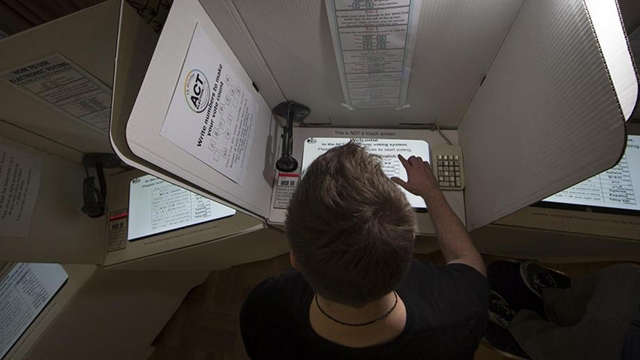While online voting might seem like a good way to speed up the counting of ballots, it contradicts basic tenets of our democratic system, as ROSS PEAKE reports.
Professor Rajeev Gore is blunt: “Online voting is a really bad idea.”
This conclusion is based on his extensive research in the ANU College of Engineering & Computer Science (CECS).
However, it is possible that advice from Gore and his colleagues could lead to Australia implementing booth-based computer voting, rather than Internet voting.
The idea that the Electoral Commission on a budget of a couple of million dollars a year can implement a secure online voting system that is immune to the worst possible kind of attack is just a joke.
The issue has been discussed widely following the crash of the Australian Bureau of Statistics’ computer system during the Census and the security issues that were identified with the iVote online-voting system used in the 2015 NSW state election.
Gore says online voting breaches fundamental principles of voting that are accepted world-wide.
“One is that your vote should not be known by anyone else other than you – it’s secret,” he says.
“The other one is that you shouldn’t be able to prove how you voted because, if you can, then you can be coerced.
So electronic voting breaks two of the most fundamental principles of voting.
“Those principles were actually invented in Australia – the secret ballot is an Australian invention.
“In the current paper-based system, there is no way to prove you voted the way someone wanted you to, which means you automatically stop anyone trying to coerce you.
“However, the problem with electronic voting is you vote on your device which means anybody sitting next to you can see exactly what you are doing, so you can be coerced, and secondly, when you vote, the vote can be tied to your identity by the Electoral Commission that is receiving your vote.
“The government shouldn’t know how you vote but with electronic voting, there is a chance the government would know exactly how you voted.”
Gore acknowledges the public is curious about doing away with paper and pencil at election time.
“The politicians say, ‘yes of course, why can’t we do that?’ and they dump the problem on the Electoral Commissions, and the commissions put out a tender – what they do not do is to demand from the vendor that the software meets the highest rigorous standards of ‘mission critical’ software,” he says.
“The Internet is a very dangerous place and you really need to know what you’re doing when you allow your computer to interface with the Internet or do things using complicated vote-counting algorithms such as single transferable voting.
“The idea that the Electoral Commission on a budget of a couple of million dollars a year can implement a secure online voting system that is immune to the worst possible kind of attack is just a joke.”However, it is common practice for Australians to do millions of dollars’ worth of transactions on internet banking every day.
Electronic banking ‘riddled with fraud’
The benefits of electronic banking outweigh the fraud because they can pass the costs on to the customer.
Gore shoots down any prospect that the routine use of online banking is a reliable basis for establishing electronic voting.
“Electronic banking is far from secure – it’s actually riddled with fraud,” he says.
“However, for the banks, it’s worth it for them to do as a commercial venture – the benefits of electronic banking outweigh the fraud because they can pass the costs on to the customer.
“So when money disappears from my account for some reason, I complain to the bank and the bank reimburses me if they got hacked.
“They just pass on all those costs to the customer, so I pay higher fees and charges.”
Professor Gore and CECS Research Fellow Dr Ekaterina Lebedeva have uncovered bugs in the vote-counting software used by the ACT Electoral Commission for the trial of booth-based computer voting in several territory elections.
Lebedeva’s expertise lies in analysing the counting algorithms that are produced from converting multiple pages of legislation into a computer program.
“While programming language is really precise, natural language is not, so when you convert legislation into a computer program, where is the guarantee they mean the same thing?” she says.
Gore says national leadership is needed to put Australia on the map with electronic booth-based voting.
“But let’s do it properly – what we need is for the very good researchers working in Australian universities in this area to be tapped on the shoulder,” he says.
“The government and the Electoral Commission should be saying ‘help us’, but instead we are always seen as the bad guys because we tell them their software has got bugs or some component of their set up is not secure.”
This article was originally published in ANU Reporter.

